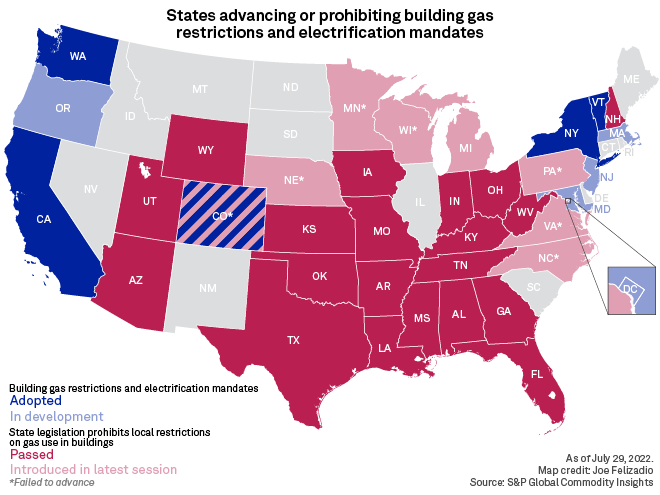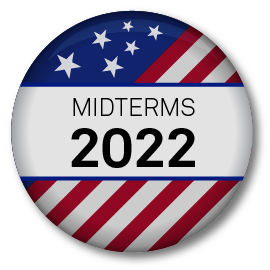
| North Carolina is one of several states where lawmakers are likely to reintroduce bills to prohibit local gas bans, which often failed to pass into law over the past year. Source: Mlenny/iStock / Getty Images Plus via Getty Images |
Upcoming elections will determine whether state lawmakers have the votes to prohibit gas bans in new buildings, while a few contests could affect efforts to require all-electric construction.
|
The campaign to prohibit natural gas use in buildings in U.S. cities has continued to evolve, while a countermovement to prohibit the policy stalled out in 2022. This comes after a lawmaking blitz in 2020 and 2021 that saw at least 20 states pass laws that explicitly preempt local authority to adopt gas bans.
GOP victories in state elections could help break through Democratic opposition, which has torpedoed some preemption bills. In some states where the bills did not advance, Republicans have a path to securing the governor's mansion or adding enough statehouse seats to override vetoes. In other states, passage appears more challenging.
To be sure, the issue is not strictly partisan. Preemption bills have drawn broad bipartisan support in a few states, and at least some Democrats usually vote for them, which could be critical to overriding future vetoes. But Democrats have mostly opposed the bills, while Republicans almost always back them.
"I feel this is important legislation as it will protect natural gas and those providers who have been in our state for a long time," said Nebraska State Sen. Joni Albrecht, a Republican who plans to reintroduce a preemption bill that did not pass in 2022.
Gas utilities also continue to support preemption legislation and push for a broader portfolio of decarbonization solutions.
"Black Hills Energy supports, and is a partner in, pursuing all sensible paths to reducing emissions and providing affordable, safe and reliable energy for our customers today and tomorrow," Black Hills Corp. government affairs manager Jill Becker said in a joint email with Albrecht. "[H]owever, forced electrification is not the answer."
Bills to block gas bans could get 2nd life
The legislation appears to have a path forward in Nebraska, where the unicameral legislature's 60-day session provided insufficient time to pass Albrecht's bill into law.
The legislature is nonpartisan, but a large majority of lawmakers identify as Republicans, and polling indicates the governorship will remain under GOP control.

Timing was also an issue in Wisconsin, where Republicans introduced preemption legislation just before the session ended in March. The GOP controls both the Senate and Assembly heading into elections, while Democratic Gov. Tony Evers is fighting for political survival in a tight race.
The GOP's solid statehouse majority puts veto-proof support for preemption legislation within reach, provided Republicans can pick up seats in both chambers or attract Democratic votes.
The North Carolina General Assembly may also have the votes to prohibit local gas bans. A House preemption bill initially drew the support needed to override Democratic Gov. Roy Cooper's veto. However, a Senate-amended version did not garner enough votes.
Environmental groups expected the legislation to resurface and pass if sponsors drop a divisive provision added in the Senate. Republicans would have a veto-proof majority if they hold their current seats and pick up two seats in the Senate and three in the House.
Headwinds for gas ban opponents
Hurdles for preemption bills will likely remain in place in Pennsylvania, where outgoing Democratic Gov. Tom Wolf vetoed the legislation in July. Democrat Josh Shapiro has a commanding lead in the contest to replace Wolf.
Overriding another veto would require a strong showing in statehouse elections. The preemption bill got enough support in the Senate to override Wolf's veto, but the House fell short by more than a dozen votes.

The legislation also faces headwinds in Michigan, where a preemption bill recently passed in the GOP-controlled House on a mostly party-line vote.
Republicans also control the Senate, but Democratic Gov. Gretchen Whitmer holds a lead in her reelection bid. The House bill passed 61-45, signaling supporters do not have the votes to override a veto.
In Minnesota, the anti-gas ban push has not gained traction since Republicans first introduced legislation in early 2020. A GOP-controlled Senate committee gave Senate Bill 2185 a favorable recommendation in March, but it has not advanced since then.
Democratic Gov. Tim Walz is leading in the polls, while Democrats and Republicans are defending slim majorities in the House and Senate, respectively.
Gas bans in play in races for governor
Gubernatorial races could affect building electrification movements in several states, including Oregon, which could elect a Republican governor for the first time in 40 years. A third-party bid by a former Democrat has split the vote, imperiling Democratic candidate Tina Kotek.
A shift in political power could shake up efforts to allow cities to adopt reach codes, which are more stringent than the state's base energy code. Eugene, Ore., is also seeking to develop a local gas ban, though city councilors are treading carefully to avoid a conflict with state codes.

In Massachusetts, Democratic Attorney General Maura Healey holds a large lead in the race for governor. She has vowed to allow towns and cities to adopt gas bans, though some climate activists remained skeptical of her campaign promise.
Democrat Wes Moore is trouncing his Republican rival in Maryland's gubernatorial race. Moore's victory would install a Democratic administration to oversee the development of an all-electric building code set in motion by the state's Climate Solutions Now Act of 2022.
Similarly, New York is preparing to incorporate building electrification mandates into its building code. Polls have tightened in New York, though Democratic Gov. Kathy Hochul's administration remains poised to oversee the state's climate agenda.

S&P Global Commodity Insights produces content for distribution on S&P Capital IQ Pro.




